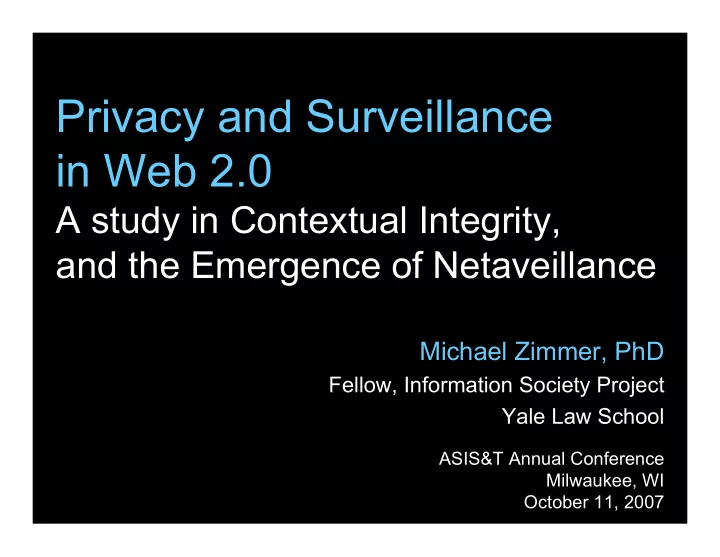

Privacy and Surveillance in Web 2.0 A study in Contextual Integrity, and the Emergence of Netaveillance Michael Zimmer, PhD Fellow, Information Society Project Yale Law School ASIS&T Annual Conference Milwaukee, WI October 11, 2007
Privacy and Surveillance in Web 2.0 • Requires conceptualization of privacy as “contextual integrity” • Informational voyeurism leads to notion of “netaveillance” 2
Personal Information Flows 3
Personal Information Flows 4
No Expectation of Privacy? Kids today. They have no sense of shame. They have no sense of privacy. They are show-offs, fame whores, pornographic little loons who post their diaries, their phone numbers, their stupid poetry—for God’s sake, their dirty photos!—online. New York Magazine 5
No Expectation of Privacy? [The] Internet has unleashed the greatest outburst of mass exhibitionism in human history. …millions of Americans are gleefully discarding – or at least cheerfully compromising – their right to privacy. They're posting personal and intimate stuff in places where thousands or millions can see it. Washington Post 6
Freddi Staur (ID Fraudster) 7
Freddi Staur (ID Fraudster) • 87 of the 200 Facebook users contacted responded to Freddi, with 82 leaking personal information (41% of those approached) – 72% divulged one or more email address – 84% listed their full date of birth – 87% provided details about their education or workplace – 78% listed their current address or location – 23% listed their current phone number – 26% provided their instant messaging screenname 8
Privacy as Contextual Integrity • Privacy != Secrecy • Privacy != Dichotomy of public/private • Privacy is contextual • Governed by norms of information flow • If norms are breached, contextual integrity is violated 9
Facebook’s Mini-Feed 10
Facebook’s Mini-Feed “We didn’t take away any privacy options. The privacy rules haven’t changed. None of your information is visible to anyone who couldn’t see it before the changes. … Nothing you do is being broadcast; rather, it is being shared with people who care about what you do—your friends” 11
Pre Mini-Feed Before After 12
Facebook’s Mini-Feed 13
Privacy as Contextual Integrity To teens, all personal information is not created equal. They say it is very important to understand the context of an information- sharing encounter “Teens, Privacy, and Online Social Networks” 14
Shifting Norms? • Contextual Integrity is dependant on preservation of existing norms of information flow • Are open information flows becoming a new norm? 15
Informational Voyeurism 16
Informational Voyeurism Plazes Dopplr Upcoming 17
Informational Voyeurism 18
Informational Voyeurism Digg Flickr YouTube Twitter 19
Strained Terminology & Theory • Surveillance: to watch over – Lateral surveillance – Peer-to-peer surveillance • Panopticon: – Participatory panopticon – Non-opticon • Equivaillence • Sousvaillance 20
“Netaveillance” • “Neta” ネタ – Tidbits of life shared as social currency • Netaveillance – Openly and purposefully providing a continual stream of the details of one’s daily life – Coupled with ability to view and capture similar streams from others 21
Privacy and Surveillance in Web 2.0 A study in Contextual Integrity, and the Emergence of Netaveillance Michael Zimmer, PhD Fellow, Information Society Project Yale Law School michael.zimmer@yale.edu http://michaelzimmer.org
Recommend
More recommend